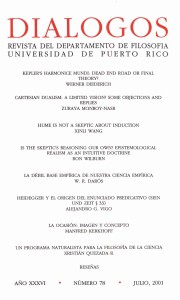Resumen
Any philosopher who aims to challenge the accepted understanding of a well-known concept, to argue that it has been misunderstood up to his/ her time, and to give it a new account, is liable to get carried away and to appear to be debunking the concept itself rather than the accepted interpretation of it. David Hume is not an exception. Hume wants to give a different justification, i.e., epistemic justification, of induction from the traditional logical justification. But his language suggests, not that he is justifying the epistemic legitimacy of induction, but that he is telling us that inductive inferences are not rationally justifiable, and hence the beliefs arrived at via inductive infere nces are (and must remain) irrational. Perhaps this explains why Hume scholars before the 1970's have almost all agreed that Hume believes that induction is not only logically illegitimate, but also epistemically worthless. Hume is regarded as a dead-heart radical skeptic about induction.

Esta obra está bajo una licencia internacional Creative Commons Atribución-NoComercial 4.0.

